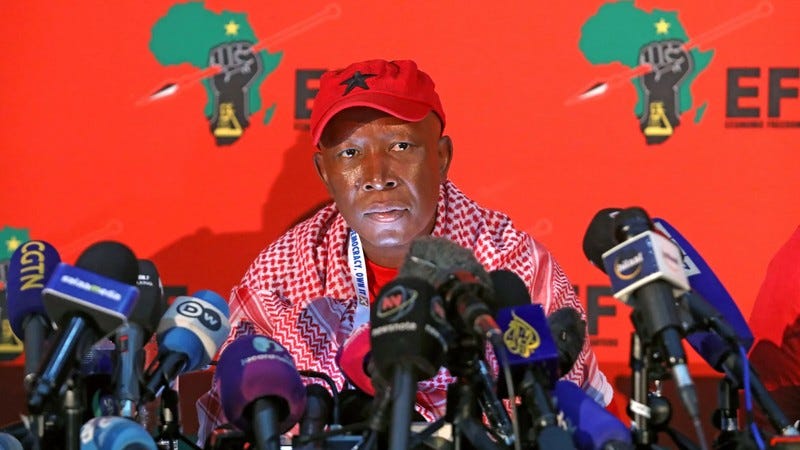South Africa's Crossroads: Social Progress or Economic Growth?
Navigating the ANC's Coalition Choices and Their Far-Reaching Implications
The constant battle between social progress and economic growth continues to plague South Africa and has become most prominent in discussions about who the ANC will choose as their coalition partner. If they opt to go for the far left, which advocates for the expropriation of land without compensation, it would require amendments to the constitution. Alternatively, if they opt to join the DA, they would protect the constitution and promote market growth and foreign direct investment—or so we hope.
News24 has been circulating information about the positive market forces South Africa is likely to experience if the ANC opts for a coalition with the DA, which is likely to include the IFP to create a government of national unity. There seems to be a great focus on the economic growth that South Africa could feel, but with a lack of consideration and prioritization for the conflicting stances the ANC and DA have on social upliftment policy. Moreover, the optimism surrounding the ANC-DA coalition is very reminiscent of the optimism felt by South Africans when President Cyril Ramaphosa took office. Yet, five years later, the country has seen the worst loadshedding, the highest unemployment, and a slow-declining economy. President Ramaphosa's first term was the opposite of what many envisioned.
Furthermore, there is a lack of analysis of South Africa's tension with race politics. Post-democracy, beyond the first government led by President Nelson Mandela and Deputy F.W. de Klerk, South Africa has never witnessed governance between the ANC and the DA. Many feel it would be a direct betrayal of their desire to be freed from white rule, with many South Africans dealing with the trauma of the past and feeling the Truth and Reconciliation Council, led by the late Desmond Tutu, had failed to achieve justice for the oppressors. Additionally, there is a growing consensus that black South Africans have been given political freedom but very little economic freedom. Discussions around spatial apartheid, land, and the desire for accountability for white monopoly capital continue to dominate. The division between black and white is entrenched in every aspect of living.
Moreover, with the constant battle between the private sector and government, the DA's willingness to protect private sector interests and the ANC's constant push to make them accountable and deconstruct monopolies are at odds. There is concern about which interest groups will come to the forefront within the government. Much of the optimism among market analysts is based on the expectation of increased investor confidence as the risk of land expropriation decreases without a left-leaning coalition. There seems to be a growing willingness among investors to establish roots in South Africa, given the perceived guarantee of political stability. However, if the DA and the ANC purge each other or fail to keep their commitments over the next five years, the issues that brought them together could very well tear them apart.
Conversely, if the ANC opts for the left, which prioritizes social upliftment over economic growth, there would be a heavy focus on returning land and resources to the government, requiring amendments or abolishments of the constitution. Without legal changes, they would be acting unlawfully under the current constitution. Julius Malema notes that with minerals being exported to European countries, South Africans see very little monetary value for the wealth being extracted. Thus, he believes the government should nationalize infrastructure such as banks, transport, and electricity. The EFF, his party, consistently pushes for expropriation without compensation, putting much white monopoly capital at risk, as 80% of the land is owned by 20% of the population. However, if done correctly, reinvestment into the social system and the creation of a government-led market would mean more South Africans have access to opportunities and jobs. The population would become more upskilled, and the necessity to rely on the state would decrease as people become more self-reliant. This approach takes significantly longer and requires intensive legal battles, which raises questions about its feasibility. But it clearly guarantees greater outcomes for the South African public in the long term.
The South African economy prides itself on monopolistic practices, leaving very few opportunities for people of color to create their own industries. If they become too competitive with traditional companies in an industry, they are bought out at high prices and taken over by the same large companies. In telecommunications, for instance, there are Vodacom, MTN, Cell C, and Telkom, which is state-owned. Over the past 30 years, there has been limited competition in the markets, allowing for collusion and an increase in data prices around the country. Without a direct challenge to the market, the economic exclusion felt by many South Africans is likely to worsen, potentially leading to civil unrest.
This coalition will very much represent what South African politicians prioritize and value. Already, the ANC and the DA have called for the protection of the rule of law. It is likely that a government of national unity will emerge, but the layers of this coalition have the potential to split the country forever. Social development or economic growth—which would you choose?


